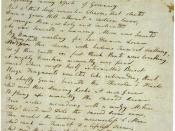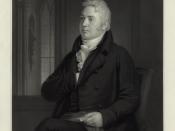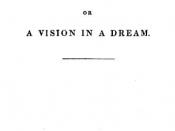Samuel Taylor Coleridge's poem "Kubla Khan" is described by the author himself as a fragment, a part of a whole that is no longer retrievable from his memory. The sub-title for the poem, "or A Vision in a Dream, a Fragment," supports the fact that Coleridge indeed felt that the poem was incomplete. Despite this opinion, however, the poem seems whole to the dreamer. "Kubla Khan" seems to parallel Coleridge's reality rather closely when compared to his description of the occurrences which forced him to leave the poem, in his opinion, unfinished. "Kubla Khan" parallels to reality and was never meant to be completed by Coleridge.
The first three stanzas of the poem depict an idyllic natural scene. The pleasure dome, constructed by Kubla Khan in Xanadu, is described as a paradise of nature's splendor, unspoiled by man: "Where Alph, the sacred river, ran / Through caverns measureless to man / Down to a sunless sea" (lines 3-5).
In describing the caverns as "measureless to man", Coleridge ascribes them a quality of mystery, and adds to the unspoiled image of the land, since men have not yet combed and cataloged its every inch.
According to Coleridge's description, this paradise is not reminiscent of a calm and gentle scene. Throughout the first three stanzas, Coleridge contrasts soft, warm images of nature's beauty to raw and dangerous images of her power: "A savage place! as holy and enchanted / As e'er beneath a waning moon was haunted / By woman wailing for her demon lover! (lines 14-16). The combination of "savage" and "enchanted" forms a very potent contrast; one that expresses Coleridge's rapture for the scene he describes. An even more powerful contrast is formed between "holy" and "demon lover". The use of these words in the same line to describe...


